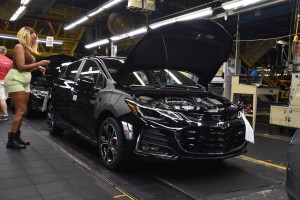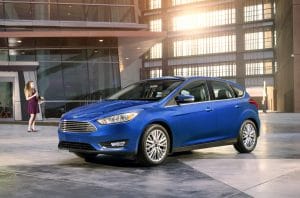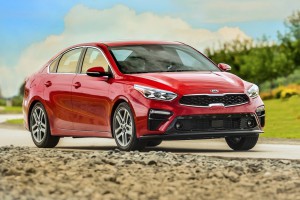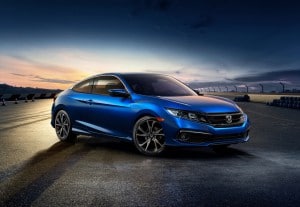
General Motors is phasing out its small cars, like the Chevrolet Cruze that was produced at the now-sold plant in Lordstown, Ohio.
A new study from Edmunds reveals that the decision by Ford Motor Co. and General Motors Corp. to bail out of small cars isn’t working out quite as planned.
A year after both carmakers announced plans to cut production of small passenger cars, analysts at Edmunds found “that instead of jumping on the SUV bandwagon, 42% of Cruze and Focus owners are choosing to stay in the passenger car segment.”
So far this year, 23% of Cruze owners and 31% of Focus owners who traded in their car for another car bought from a competitor, according to the new report from Edmunds.
(Lordstown plant manufactures last Chevy Cruze)
Edmunds analysts, however, said losing these shoppers to the competition could hurt GM and Ford in the long run because the compact car segment is the largest passenger car segment, representing 9.1% of all vehicles sold in the U.S. through September of this year, and compact car owners are among the most brand loyal.

Ford Focus owners aren’t necessarily shifting into Ford SUVs when they move out of their small cars.
“Ford and GM made a strategic decision to prioritize profit at the expense of market share,” said Edmunds Executive Director of Insights Jessica Caldwell. “While this may set them up better in the long run so they have the cash they need to fund electrification and autonomy, there’s no question that decision is giving their competitors an edge now.”
The loyalty of Cruze and Focus owners has been steadily declining during the last three years.
The percentage of Focus owners trading in their vehicle and buying another Ford has declined from 40% in 2016 to 33% through September of this year.
During the same period, however, Ford was recalling thousands of Focuses to address a defective transmission. The problem with the Focus transmission finally came to a head this summer when Ford’s management finally acknowledged to scope of the problems. The company has now earmarked millions of dollars to fix the problem and the cost has forced the company to revise downward its estimates of fourth-quarter earnings.
Overall, though, the drop in brand loyalty is more pronounced with General Motors customers who own a Chevrolet Cruze. Fully 45% of Cruze owners elected to trade in their vehicle for another Chevrolet vehicle so far this year, compared to 57% in 2016.
(Ford kills Focus crossover due to Trump tariffs)
Many former Cruze and Focus owners are going into competitive equivalents such as the Honda Civic and Toyota Corolla. But other brands are proving attractive as well. The number of Focus and Cruze owners trading their vehicles in and buying a small Jeep, a Hyundai Kona or Elantra, Kia Forte or Subaru Crosstrek have all risen in the last three years, Edmunds found.
A share of former Cruze and Focus owners have move into one of SUVs built by GM and Ford just as both companies predicted. So far this year, 21% of Cruze owners who traded in their vehicle bought a Chevrolet SUV, and 18% of Focus owners traded in their car for a Ford SUV.
The buyers who are choosing to move up to an SUV are those with extra cash to spend, as small SUVs can cost between $4,000 and $8,000 more than buying another small car.
As the average price of a new car now hovers in record territory, Edmunds analysts noted, and rising costs puts continued pressure on younger and more price-sensitive buyers.

Despite the segment shrinking, Kia is plowing ahead with small cars with an all-new 2019 Forte sedan.
“The catch is, if Ford and GM don’t have affordable options for shoppers who are buying their first or second new car, it could be much harder to win them over later,” Caldwell noted. “Catching consumers early and keeping them in the family has been a basic tenet of automotive brand strategy for decades. But it feels like we’re in the midst of a transformative time for the industry where automakers are being forced to rethink everything. Time will tell if it will end up the right call in the long run.”
One GM executive, however, suggested the increase in average transaction prices really doesn’t matter because it has been offset by an increase in personal wealth in the U.S., which is now sitting at record levels.
(Toyota staying in car market for the long haul)
“One thing is household median wealth is extremely high by historical” standards, Elaine Buckberg, GM chief economist said. The wealth effect makes it easier for “certain households” to finance more expensive vehicles, she said during a panel discussion at the annual OESA Automotive Supplier Conference.


Confirming what everyone (except for the decision makers) said would happen. I guess when you’re pulling in million dollar salaries you don’t think like the Joe Six-pack.
Another concern about Hackett’s strategy. As with its decision to reverse course after a long delay and bring the new Ranger to the U.S. market, one has to wonder if/when it might retrench and push back into at least SOME passenger car segment(s). The question would be how much damage has been done by pulling out? And could Ford recover in those segments it might return to?
Paul E.
Agree with both. Short term SUV money boost will turn into long term money disaster. Sound familiar doesn’t it.
What these company heads don’t understand is it’s not that people don’t want small cars or sedans; it’s they don’t want crappy small cars and sedans.
Not everyone is going to want to buy their 16yo / first time driver a big honking CUV / SUV / truck, and that 16yo / FTD may not want that type of vehicle either. First vehicles are mostly small cars.
But on another note, that first pic with the worker wearing shorts and non-work boots may be one of the reasons Lordstown closed up shop. You don’t wear those types of clothes on the line, period.